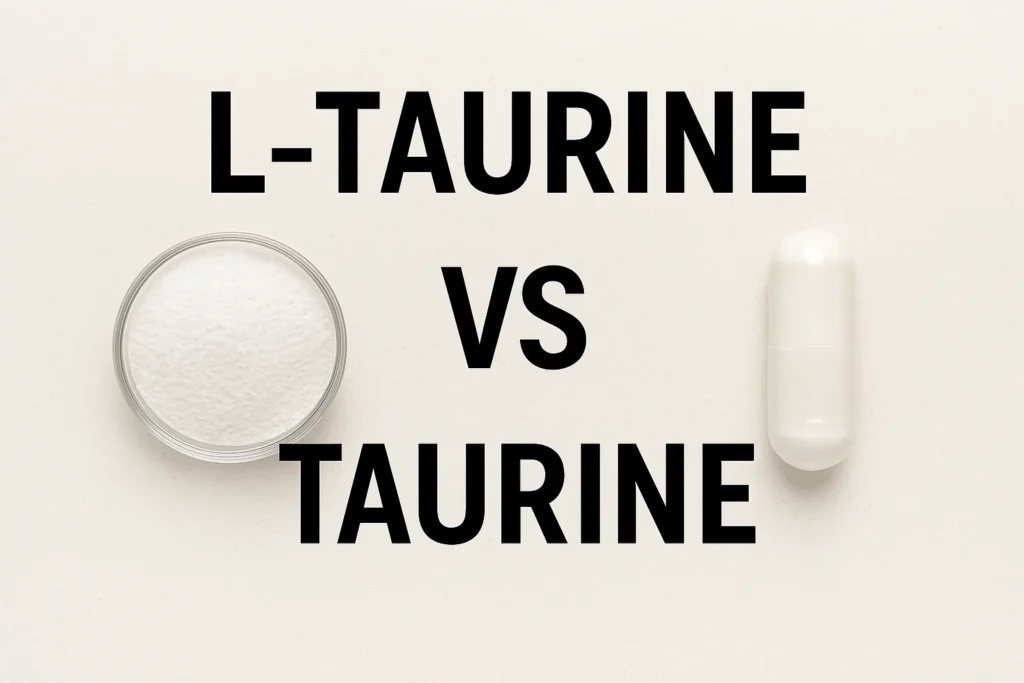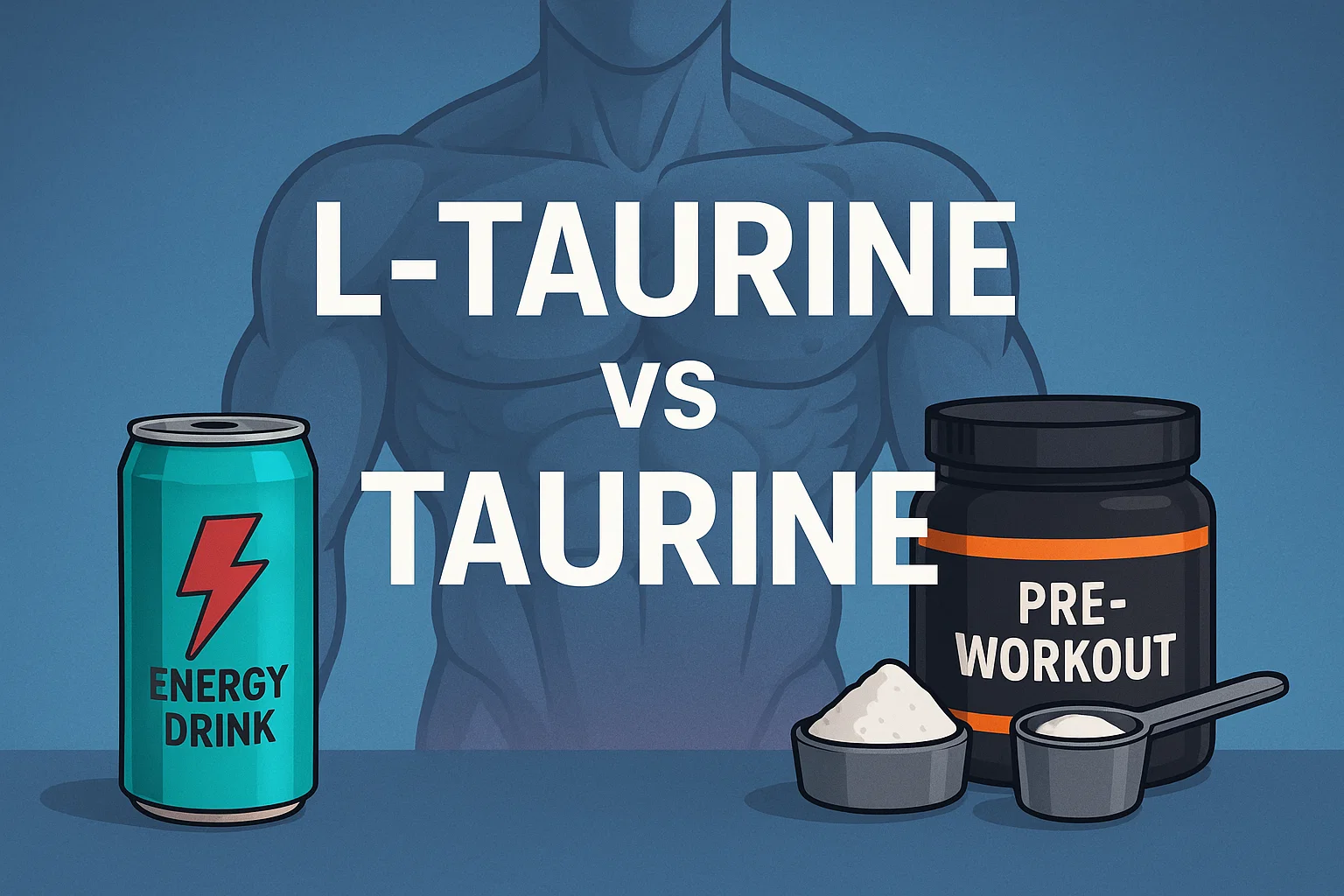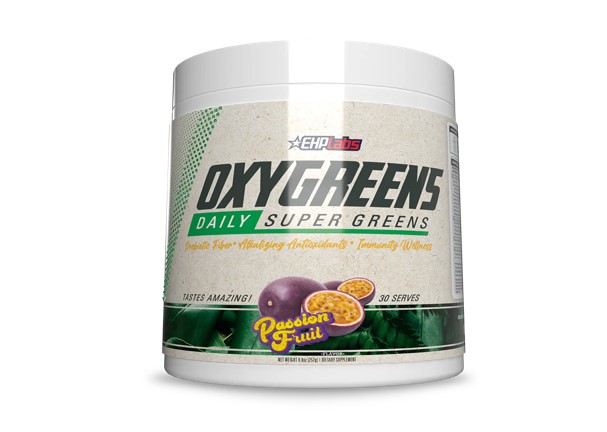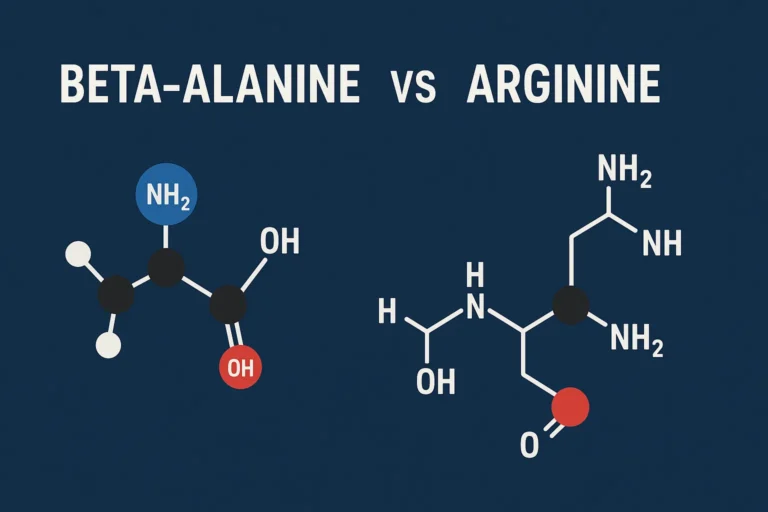L-Taurine vs Taurine: Key Differences and Health Benefits Explained
In the world of sports supplements, energy drinks, and overall wellness products, taurine is a frequently discussed ingredient. However, many people find themselves confused between L-Taurine and Taurine, two forms of the same amino acid.

Are they really different? And which one is the best for your health and fitness goals? In this comprehensive Taurine vs L-Taurine guide, we’ll explore everything you need to know about these two forms of taurine, their unique characteristics, and how they are used in various supplements to maximize your performance, recovery, and overall health.
Table of Contents
What is L-Taurine?
When you see “L-Taurine” on a supplement label, you’re looking at the biologically active form of taurine that your body naturally uses. The “L” in L-Taurine stands for “levorotatory,” indicating that the amino acid is in the form that can be absorbed and utilized by the body.
L-Taurine is essentially the most effective and usable form of taurine. It’s the same compound found in the human body and plays a crucial role in muscle function, heart health, and the nervous system. Because of its high bioavailability, L Taurine is preferred in supplements, especially those targeting physical performance, energy, and mental clarity.
In many cases, taurine supplements contain L-Taurine because it ensures maximum absorption and efficacy. If you’re looking for a taurine supplement to support your athletic performance or mental focus, L-Taurine is often the ideal choice.
What is Taurine?
Taurine is a sulfur-containing amino acid that naturally occurs in the body. Found in high concentrations in the heart, brain, eyes, and muscles, taurine plays a vital role in several key physiological processes. While it’s not used to build proteins like other amino acids, taurine’s function is crucial for your body’s metabolic processes.
Taurine has been shown to regulate hydration and electrolyte balance, support cardiovascular health, maintain proper nerve function, and even contribute to the development of the brain. It is also involved in bile salt formation, which aids in fat digestion.
In the supplement world, Taurine is commonly used to enhance energy, improve endurance during workouts, and even support cognitive function. Taurine can be found in a variety of supplements, from energy drinks and pre-workouts to fat burners and amino acid complexes.
L-Taurine vs Taurine: Key Differences
Even though Taurine and L-Taurine refer to the same amino acid, their applications and bioavailability can differ. Here’s a breakdown of the key differences:
1. Absorption and Effectiveness
- Taurine in its broader form may need to be converted by the body into the active L-Taurine before it can be used effectively. This means that non-specific taurine may not be as efficiently absorbed.
- L-Taurine, being the form naturally utilized by the body, is the most efficient version for supplementation. It’s highly bioavailable, meaning your body absorbs it quickly and utilizes it effectively for improved energy levels, muscle function, and overall well-being.
2. Supplementation and Usage
- L-Taurine is the preferred form in supplements because of its superior absorption. When you see taurine listed in energy drinks, pre-workouts, or amino acid complexes, it is likely to be L-Taurine.
- Taurine may sometimes be found in non-specific forms in energy drinks or as part of a more general amino acid blend. While it still offers benefits, the bioavailability and efficiency may not be as high.
3. Chemical Structure and Form
- Taurine: This is a general term that may refer to taurine in any form, including inactive or less bioavailable forms.
- L-Taurine: Refers specifically to the biologically active form of taurine. This form is what your body needs for optimal functioning and is the version most commonly used in supplements.
Taurine and L-Taurine in Supplements: Usage and Benefits
Both Taurine and L-Taurine provide similar health benefits, but because L-Taurine is more bioavailable, it is typically the form that yields the best results when taken as a supplement. Here’s how taurine and L-Taurine are used in supplements and what you can expect from their benefits:
1. Energy Boost
Taurine and L-Taurine are both used in energy drinks and pre-workout supplements due to their ability to increase energy levels and reduce fatigue. L-Taurine is especially effective in supporting the nervous system, helping you stay focused and energized for longer periods, especially during physical exertion.
- L-Taurine works synergistically with caffeine and other stimulants found in energy drinks, ensuring a smoother, more sustained energy boost without the jitters often associated with caffeine alone.
2. Exercise Performance and Endurance
L-Taurine is highly regarded for its role in enhancing athletic performance. Studies have shown that it helps with:
- Reducing muscle fatigue
- Improving endurance during exercise
- Enhancing post-workout recovery
For athletes and fitness enthusiasts, L-Taurine is beneficial for improving stamina, increasing strength, and speeding up recovery times.
3. Muscle Recovery and Health
Taurine, especially L-Taurine, plays a crucial role in muscle recovery. It supports electrolyte balance and hydration, both of which are key for optimal muscle function during and after intense workouts.
- L-Taurine helps reduce muscle damage and soreness, promoting faster recovery and reducing the risk of injury.
4. Heart Health and Blood Flow
Taurine has significant benefits for heart health. It helps regulate blood pressure, improves circulation, and supports overall cardiovascular function. L-Taurine in particular is known for its protective effects on the heart by maintaining proper blood flow and preventing conditions like high blood pressure.
5. Cognitive Function and Focus
Taurine, and particularly L-Taurine, plays a role in brain health and cognitive function. It has been shown to:
- Support neurotransmitter balance
- Enhance mental focus
- Improve memory retention
This is why taurine is often included in nootropic and focus-enhancing supplements, helping individuals maintain mental clarity during demanding tasks.
Taurine vs L-Taurine in Energy Drinks and Supplements
You’ll find both Taurine and L-Taurine in many popular energy drinks and pre-workout formulas. These products use taurine because it:
- Enhances mental clarity
- Boosts physical performance
- Supports cardiovascular health
Energy drinks that contain L-Taurine offer a smoother energy boost without the crash, while supplements with taurine (if not the L-form) may not be as effective for energy enhancement and recovery.
Which Form Should You Choose for Supplementation?
If you’re considering taking taurine as a supplement, L-Taurine is the clear winner due to its superior bioavailability and effectiveness in the body. Whether you’re looking to improve exercise performance, enhance cognitive function, or support your heart and brain health, L-Taurine is the best choice for achieving maximum results.
- L-Taurine is ideal for energy drinks, pre-workouts, and recovery supplements.
- If you’re unsure whether a taurine supplement contains L-Taurine, always check the label for the specific form listed for optimal results.
Foods Rich in L-Taurine
L-Taurine is primarily found in animal-based foods, particularly in tissues that are rich in protein. Here are some common foods that contain L-Taurine:
- Meat and Poultry
- Beef
- Lamb
- Pork
- Chicken
- Seafood and Fish
- Shellfish (especially oysters, mussels, and clams)
- Fish (salmon, tuna, sardines, cod)
- Shrimp
- Dairy Products
- Milk
- Cheese
- Yogurt
- Eggs
- Eggs (especially egg yolks)
- Other Sources
- Organ meats (liver, heart)
- Certain energy drinks and supplements
Since L-Taurine is abundant in animal products, individuals who follow a vegetarian or vegan diet may have lower taurine intake and may need to consider supplements.
Recommended Dosage of L-Taurine
The appropriate dosage of L-Taurine can vary depending on factors such as age, weight, and health status. However, the general dosage recommendations are as follows:
- Standard Supplement Dosage:
- Typically, 500 mg to 2,000 mg of L-Taurine per day is considered safe and effective for general health and performance benefits.
- For Athletic Performance:
- Doses between 1,000 mg and 2,000 mg are commonly used before workouts to improve performance and reduce muscle fatigue.
- For Health Conditions:
- Higher doses may be used under medical supervision, especially for heart or neurological conditions, with dosages reaching up to 3,000 mg per day.
Read also: Taurine vs Theanine
Potential Side Effects of L-Taurine
L-Taurine is generally considered safe when taken in appropriate amounts. However, as with any supplement, there may be some side effects, especially when taken in large doses:
- Gastrointestinal Issues:
- Some people may experience mild stomach upset, nausea, or diarrhea.
- Interaction with Medications:
- L-Taurine may interact with medications, particularly those that affect heart function, such as diuretics or blood pressure medications. Always consult with a healthcare provider before adding L-Taurine to your regimen if you are on medication.
- Overconsumption Risks:
- While L-Taurine is generally safe, taking excessively high doses (above 3,000 mg per day) for extended periods may lead to unwanted side effects, including dehydration or electrolyte imbalance.
- Allergic Reactions:
- Though rare, some people may be allergic to taurine or the ingredients in taurine supplements, leading to rashes, swelling, or difficulty breathing. If any of these symptoms occur, discontinue use and seek medical advice.
Conclusion: L-Taurine vs Taurine
In the L-Taurine vs Taurine debate, it’s clear that while both forms of taurine have similar benefits, L-Taurine is the most effective form for supplementation. Whether you’re looking for a boost in energy, improved exercise performance, or better cognitive function, L-Taurine is the best choice for achieving maximum results.

With a Bachelor’s in Biology and Health and a Master’s degree in Quality Control of Foods and Drugs, I review dietary supplements using scientific analysis, ingredient verification, and safety standards to provide transparent and reliable recommendations.








2 Comments
Comments are closed.